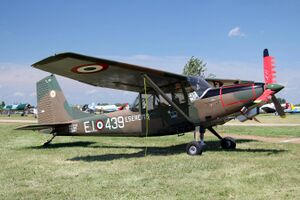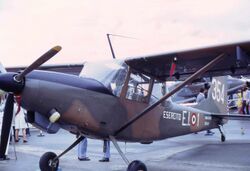Engineering:SIAI-Marchetti SM.1019
| SM.1019 | |
|---|---|

| |
| Role | STOL liaison monoplane |
| National origin | United States / Italy |
| Manufacturer | SIAI-Marchetti |
| First flight | 24 May 1969 |
| Introduction | 1976 |
| Primary users | Italian Army Somali Air Force |
| Number built | 86 |
| Developed from | Cessna O-1 Bird Dog |
The SIAI-Marchetti SM.1019 is an Italian STOL liaison monoplane built by SIAI-Marchetti for the Italian Army. It is a turboprop-powered derivative of the Cessna O-1 Bird Dog.
Development
To meet an Italian Army requirement for a short take-off liaison aircraft, SIAI-Marchetti modified the design of the Cessna 305A/O-1 Bird Dog with a new turboprop engine and a revised tail unit. The prototype first flew on 24 May 1969 powered by a 317 hp (236 kW) Allison 250-B15C turboprop engine. It was evaluated against the Aermacchi AM.3 and was successful and won a production order for 80 aircraft.
Variants
- SM.1019
- Prototype with 317hp (236kW) Allison 250-B15C turboprop engine, one built
- SM.1019A
- Production with 317hp (236kW) Allison 250-B15G 400hp turboprop engine derated to 317hp, 81 built
- SM.1019B
- Production variant with 400hp (298kW) Allison 250-B17B turboprop engine, designated SM.1019E.I by the Italian Army, four built
Operators
 Italy
Italy
- Italian Army
 Somalia
Somalia
- Somali Air Force – 6 in 1981, all retired.
Accidents and incidents
On 24 July 2021, former US Navy F-14 pilot Dale "Snort" Snodgrass fatally crashed in an SM.1019B with the registration N28U at Lewiston–Nez Perce County Airport in Lewiston, Idaho.[1][2] The probable cause of the accident was, according to the NTSB report, failure to remove the flight control lock, which immobilized flight control surfaces.[3]
Specifications (SM.1019A)
Data from Jane's All The World's Aircraft 1976–77[4]
General characteristics
- Crew: 2
- Length: 8.52 m (27 ft 11 in)
- Wingspan: 10.972 m (36 ft 0 in)
- Height: 2.86 m (9 ft 5 in)
- Wing area: 16.16 m2 (173.9 sq ft)
- Aspect ratio: 7.44:1
- Airfoil: NACA 2412
- Empty weight: 690 kg (1,521 lb)
- Gross weight: 1,300 kg (2,866 lb)
- Max takeoff weight: 1,450 kg (3,197 lb)
- Fuel capacity: 320 L (85 US gal; 70 imp gal) in four wing tanks ; Oil capacity 8 L (2.1 US gal; 1.8 imp gal)
- Powerplant: 1 × Allison Model 250-B17B turboprop engine, 298 kW (400 hp)
- Propellers: 3-bladed Hartzell HC-B3TF-7/T10173-11R constant-speed reversible pitch metal propeller
Performance
- Cruise speed: 296 km/h (184 mph, 160 kn) max at sea level
- 300 km/h (190 mph; 160 kn) max cruise speed at 2,500 m (8,200 ft)
- 281 km/h (175 mph; 152 kn) 75% power cruise speed at 2,500 m (8,200 ft)
- Stall speed: 98 km/h (61 mph, 53 kn) flaps up
- 70 km/h (43 mph; 38 kn) flaps extended
- Never exceed speed: 313 km/h (194 mph, 169 kn)
- Range: 925 km (575 mi, 499 nmi) at sea level
- 1,090 km (680 mi; 590 nmi)
- Endurance: 5 hours 45 minutes at sea level ; 6 hours 40 minutes at 3,000 m (9,800 ft)
- Service ceiling: 7,620 m (25,000 ft)
- Rate of climb: 9.1833 m/s (1,807.74 ft/min)
- Wing loading: 80.4 kg/m2 (16.5 lb/sq ft) at 1,300 kg (2,900 lb) AUW ; 89.7 kg/m2 (18.4 lb/sq ft) maximum
- Power/mass: 4.36 kg/kW (7.17 lb/hp) at 1,300 kg (2,900 lb) AUW ; 4.87 kg/kW (8.01 lb/hp)
- Take-off run: 112 m (367 ft)
- Landing run: 91.5 m (300 ft)
- Take-off run to 15 m (49 ft): 220 m (720 ft)
- Landing run from 15 m (49 ft): 220 m (720 ft)
See also
Related development
Aircraft of comparable role, configuration and era
- Aermacchi AM.3
- UTVA-66
References
- ↑ Leone, Dario (2021-07-25). "Dale “Snort” Snodgrass, legendary US Navy F-14 Tomcat pilot, killed in the crash of a SIAI-Marchetti SM.1019" (in en-GB). https://theaviationgeekclub.com/dale-snort-snodgrass-legendary-us-navy-f-14-tomcat-pilot-killed-in-in-the-crash-of-a-siai-marchetti-sm-1019/.
- ↑ "Legendary F-14 Pilot Dale 'Snort' Snodgrass Dies In A Tragic Plane Crash" (in en-US). 2021-07-25. https://theaviationist.com/2021/07/25/dale-snort-snodgrass/.
- ↑ "Snodgrass SIAI-Marchetti SM-1019B NTSB Final Report" (in en-us). 2022-07-06. https://s30121.pcdn.co/wp-content/uploads/2022/07/Snodgrass-SIAI-Marchetti-SM-1019B-NTSB-Final-Report.pdf.
- ↑ Taylor 1976, pp. 117–118.
- The Illustrated Encyclopedia of Aircraft (Part Work 1982–1985). Orbis Publishing. pp. 2856.
- Taylor, John W.R. (1976). Jane's All the World's Aircraft 1976–77. London: Jane's Yearbooks. ISBN 0-354-00538-3.
- Taylor, Michael J. H. (1989). Jane's Encyclopedia of Aviation. London: Studio Editions.
External links
 |



